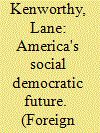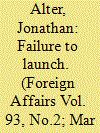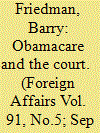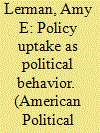| Srl | Item |
| 1 |
ID:
126274


|
|
|
|
|
| Publication |
2014.
|
| Summary/Abstract |
Since March 2010, when U.S. President Barack Obama signed the Affordable Care Act into law, the ACA has been at the center of American politics. Tea Party activists and their allies in the Republican Party have tried to stymie the law at nearly every turn. The Republican-controlled House of Representatives has voted more than 40 times in favor of repealing or defunding it, and last October the House allowed a partial shutdown of the federal government in an attempt to block or delay the law. The controversy surrounding the ACA shows no sign of ending anytime soon.
|
|
|
|
|
|
|
|
|
|
|
|
|
|
|
|
| 2 |
ID:
127924


|
|
|
|
|
| Publication |
2014.
|
| Summary/Abstract |
President Barack Obama has often said that his proudest domestic achievement is the passage of the Patient Protection and Affordable Care Act (commonly known as the ACA or Obamacare). The sprawling law, pushed through Congress in 2010 in the face of fierce Republican resistance, made numerous important changes to the U.S. health-care system -- a system so big that, on its own, it represents an economy about the size of France's.
|
|
|
|
|
|
|
|
|
|
|
|
|
|
|
|
| 3 |
ID:
142733


|
|
|
|
|
| Summary/Abstract |
Using individual-level data from the 2008 European Social Survey and country-level health care financing data we analyze the influence of private financing of health care on political trust in twenty-five European countries. Net of known predictors of trust at the individual and country level, we find that trust in government is significantly lower where the health system is financed to a greater degree by private sources. This negative relationship occurs because in countries with more private financing, low-income citizens perceive themselves to be at greater risk for not receiving needed health care. This perception of risk is associated with more negative evaluations of the performance of the health care system, which in turn is associated with less trust in government. When states do less to ensure the basic health care needs of members of society who are at greatest risk, these citizens may come to place less trust in government institutions. Hence, the increasing pressure on European governments to privatize the financing of health care in the wake of the financial crisis that is also characterized by growing income inequality threatens to make citizens trust government less. At the same time, implementation of the Affordable Care Act could signal a renaissance for political trust in the United States, if a growing role in the health care system is accompanied by a redistribution of risk.
|
|
|
|
|
|
|
|
|
|
|
|
|
|
|
|
| 4 |
ID:
114125


|
|
|
|
|
| Publication |
2012.
|
| Summary/Abstract |
Pundits predicted that the U.S. Supreme Court's ruling on the Affordable Care Act would make history. In fact, by upholding the individual mandate as a tax, the justices took themselves largely out of the picture, ensuring that the debate over health care will play out in the political sphere, where it belongs.
|
|
|
|
|
|
|
|
|
|
|
|
|
|
|
|
| 5 |
ID:
156702


|
|
|
|
|
| Summary/Abstract |
Partisanship is a primary predictor of attitudes toward public policy. However, we do not yet know whether party similarly plays a role in shaping public policy behavior, such as whether to apply for government benefits or take advantage of public services. While existing research has identified numerous factors that increase policy uptake, the role of politics has been almost entirely overlooked. In this paper, we examine the case of the Affordable Care Act to assess whether policy uptake is not only about information and incentives; but also about politics. Using longitudinal data, we find that Republicans have been less likely than Democrats to enroll in an insurance plan through state or federal exchanges, all else equal. Employing a large-scale field experiment, we then show that de-emphasizing the role of government (and highlighting the market's role) can close this partisan gap.
|
|
|
|
|
|
|
|
|
|
|
|
|
|
|
|
| 6 |
ID:
126323


|
|
|
|
|
| Publication |
2013.
|
| Summary/Abstract |
President Barack Obama's two signature first-term legislative victories-the Affordable Care Act and the Dodd-Frank Act-are the law of the land, but the political battle over their entrenchment continues. The question now is whether these landmark reforms will be consolidated and create a new politics going forward. We develop an argument about the limits of policy feedback to illuminate the obstacles to durable liberal reform in the contemporary American state. We argue that political scientists have paid insufficient attention to the fragility of inherited policy commitments, and that the capacity of reforms to remake politics is contingent, conditional, and contested. Feedbacks are shaped not only by the internal attributes of policies, but also by the interaction between policy-specific characteristics, the strategic goals of officeholders and clientele groups, and the political forces arising from a contentious and uncertain political environment.
|
|
|
|
|
|
|
|
|
|
|
|
|
|
|
|
| 7 |
ID:
153375


|
|
|